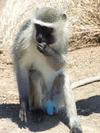Self Organized Networks
For queries about this topic, contact Dimitrios Alanis.
View the calendar of events relating to this topic.
Projects

A Connected Island: how the Iron Curtain affected Archaeologists in Central Europe
Iza Romanowska
Using citation network analysis this project aims to investigate the effects that the Cold War had on researchers on both sides of the Iron Curtain.

Associative learning in ecosystems: Network level adaptation as an emergent propery of local selection
Richard Watson, James Dyke (Investigators), Daniel Power
Ecosystems may exhibit collective adaptive properties that arise from natural selection operating on their component species. These properties include the ability of the ecosystem to return to specific configurations of species, in a manner highly analogous to mechanisms of associative learning in neural networks.

Excitable Boys: An Exploration of the Role of Social Groups in the Self-radicalisation Process Using Agent-based Modelling.
Jason Noble (Investigator), Lewys Brace
This work built upon the seminal work of Sageman (2008), and his hypothesis that the self-radicalisation phenomenon that we are currently witnessing across Europe and the United States stems from self-organising ‘bunches of guys’. More specifically, there was a focus on how individuals can influence one another through social links; and how this can lead to behaviour, similar to deindividuation, arising through their interactions. Complexity theory and agent-based modelling were used in order to explore the interactions that are believed to lie at the heart of this psycho-social phenomenon, and justification is given for this approach. The model presented demonstrated that social bonds can lead to a greater number of individuals ‘rebelling’ against the status quo.

Integrating Automated Vehicles into the Transport Network
Bani Anvari, Ben Waterson (Investigators), Craig Rafter
Innovative new designs to transportation infrastructure - with a strong evidence base - that will support automated vehicles to maximize sustainability in the transport network.

Origins of Evolvability
Richard Watson, Markus Brede (Investigators), William Hurndall
This project examined the putative evolvability of a Lipid World model of fissioning micelles. It was demonstrated that the model lacked evlovability due to poor heritability. Explicit structure for micelles was introduced along with a spatially localised form of catalysis which increased the strength of selection as coupling between potential chemical units of heredity were reduced.

Self Organized Network Routing using Quantum Evolutionary Methods
Lajos Hanzo (Investigator), Dimitrios Alanis
Self Organized Networks (SON) may consist of a large number of nodes, which could be fully interconnected. Optimizing its performance satisfying various Quality of Service (QoS) requirements is a quite complex procedure and the optimization problem belongs to the family of the Travelling Salesman Problems (TSP) which has been proven to be NP-hard as the number of nodes increases. In this project, various suboptimal methods are used in order to tackle this multi-objective optimization problem; in particular, the Ant Colony Optimization (ACO) and its quantum inspired counterpart (QACO) are being employed in order to reduce complexity.

The Social-cognitive Niche: An Exploration of the Co-evolutionary Relationship between Human Mind and language, with a Particular Focus of the Self-organisational properties of the Emergence of Symbolic Representation.
Jason Noble, Glyn Hicks (Investigators), Lewys Brace
This work explored the relationship between the origin and subsequent evolution of the human mind and language; a relationship that is believed to be symbiotic in nature. This piece aimed to achieve two objectives. Firstly, it set out a theoretical framework, using the principles of complexity theory and self-organisation, which attempts to explain this relationship from a holistic perspective.
Secondly, it presented an agent-based model of a vervet monkey social group, which sought to investigate the variables that were perceived to underpin the emergence of symbolic representation within a population of language users.
The belief here was that, by understanding the influence of these variables, one would be able to better understand the genesis of the aforementioned relationship.
People
 Lajos Hanzo
Lajos HanzoProfessor, Electronics and Computer Science (FPAS)
 Markus Brede
Markus BredeSenior Lecturer, Electronics and Computer Science (FPAS)
 Richard Watson
Richard WatsonSenior Lecturer, Electronics and Computer Science (FPAS)
 Bani Anvari
Bani AnvariLecturer, Engineering Sciences (FEE)
 Mohamed Bakoush
Mohamed BakoushLecturer, Management (FBL)
 James Dyke
James DykeLecturer, Electronics and Computer Science (FPAS)
 Glyn Hicks
Glyn HicksLecturer, Humanities (FH)
 Ben Waterson
Ben WatersonLecturer, Civil Engineering & the Environment (FEE)
 Btissam Er-Rahmadi
Btissam Er-RahmadiResearch Fellow, Management (FBL)
 Jason Noble
Jason NobleResearch Fellow, Electronics and Computer Science (FPAS)
 Lewys Brace
Lewys BracePostgraduate Research Student, Electronics and Computer Science (FPAS)
 Greg Fisher
Greg FisherPostgraduate Research Student, Electronics and Computer Science (FPAS)
 William Hurndall
William HurndallPostgraduate Research Student, Electronics and Computer Science (FPAS)
 Adam Jackson
Adam JacksonPostgraduate Research Student, Electronics and Computer Science (FPAS)
 Konstantinos Kouvaris
Konstantinos KouvarisPostgraduate Research Student, Electronics and Computer Science (FPAS)
 Daniel Power
Daniel PowerPostgraduate Research Student, Electronics and Computer Science (FPAS)
 Craig Rafter
Craig RafterPostgraduate Research Student, Engineering Sciences (FEE)
 Iza Romanowska
Iza RomanowskaPostgraduate Research Student, Humanities (FH)
 Massimo Stella
Massimo StellaPostgraduate Research Student, Electronics and Computer Science (FPAS)
 Dimitrios Alanis
Dimitrios AlanisNone, None
 Daisuke Sasaki
Daisuke SasakiNone, None